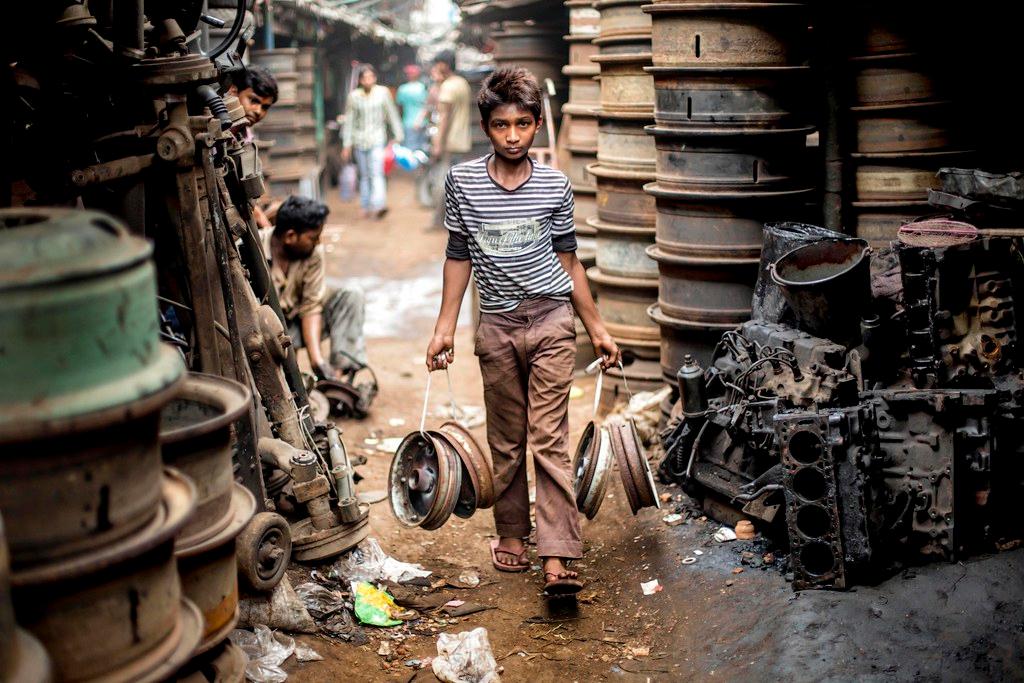Swiss firms lack ‘unified approach’ on business and human rights

Companies in Switzerland are quite active when it comes to corporate social responsibility, but a common approach is lacking and many large firms are unfamiliar with their international human rights obligations, says business ethics campaigner Chantal Peyer.
Peyer, head of business and human rights at the Swiss non-governmental organisation Bread for AllExternal link, was in Geneva on Thursday for the Second Swiss Global Compact DialogueExternal link, a conference on “Sustainable production and consumption: a challenge and chance for Swiss business”.
The Swiss initiative, comprising 56 members including ABB, Nestlé and Vale, is part of the United Nations Global CompactExternal link, the world’s largest voluntary corporate sustainability initiative. The Swiss branch has just announced a four-year campaign to promote responsible business among firms in the small alpine country.
Bread for All is part of a coalition of 105 NGOs, church groups, unions and campaigners behind the Responsible Business InitiativeExternal link, currently a hot political topic in Switzerland.

swissinfo.ch: The UN Global Compact now has almost 10,000 corporate signatories from over 160 countries. How effective is this voluntary initiative in your view?
Chantal Peyer: The Global Compact started in 2000 and was one of the first initiatives of its kind for the private sector. It has been positive in stimulating dialogue among businesses on the issue of human rights. But today it’s clear is that things have moved on a great deal. We now have the UN Guiding Principles on Business and Human Rights, and critics say voluntary initiatives are inadequate, as each company basically does what it wants. There is too much of a ‘pick-and-choose’ approach.
swissinfo.ch: In 2016, the Federal Council adopted a reportExternal link outlining a national action plan for the implementation of the UN Guiding Principles on Business and Human Rights. Switzerland claimed it was one of the first countries to adopt such a strategy. What progress have you observed?
C.P.: We haven’t really seen any progress. Right from the start, civil society was very critical of this plan of action, which was the result of a parliamentary question and published two years late by the government.
It has two weaknesses: first, it brings together everything that is already being done. It has no real vision or overall perspective on what Switzerland is doing compared to what the UN guiding principles demand. There is no analysis of the gaps of current policy. Second, the government is only promoting dialogue with companies to secure better respect for human rights, while Harvard professor John Ruggie, [who oversaw the UN guiding principles] says you need a smart mix of voluntary and binding measures. The Swiss government swept aside all political discussion on more binding measures.
swissinfo.ch: Over 30 laws and initiatives on business and human rights have been introduced worldwide since 2011, including the UK Modern Slavery Act of 2015External link and Section 1502 of the Dodd-Frank ActExternal link on conflict minerals. Which are some of the most effective?
C.P.: There is a clear trend towards a consensus that voluntary measures are good, but insufficient. Human rights due diligence has become the reference and is being written into laws in some countries. For example, in the Netherlands, the recently adopted Dutch Child Labour Due DiligenceExternal link law calls for mandatory human rights due diligence, and in the UK there is the Modern Slavery Act.
These represent major steps forward, as does the law that the French parliament adopted last year imposing due diligence on multinationals’ human rights abuses in supply chains.
Chief executive officers and the executive boards of top firms in the UK are also looking closely at their supply chains to see if there is forced labour. A recent study showed that 70% of them believe that there is forced labour or a risk of it.
In Switzerland, a recent study commissionedExternal link by the State Secretariat for Economic Affairs (SECO) into Swiss firms awareness of the OECD Guidelines for Multinational EnterprisesExternal link, showed that 63% knew of them, but less than 30% actively applied them. If you look at the annual reports of 500 biggest firms, less than 5% referred to these guidelines. We see that for Swiss firms, even if they do quite a few things, there is no unified approach or sufficient knowledge of their international obligations which they should apply.
swissinfo.ch: On Thursday, the House of Representatives adopted a counter-proposal to the Responsible Business Initiative, which is less binding in terms of human rights obligations. The Senate must still vote on it. Can this counter-proposal really improve the situation for victims whose human rights may have been violated by Swiss firms?
C.P.: We were disappointed as we were forced to compromise and drop lots of elements from our initiative in favour of the counter-proposal. But it’s a compromise that allows us to take a step forward, and something which we intend to support if it is not modified anymore.
In fact, it enables us to go much faster in finding solutions to these issues, as we will have a legal text and not a constitutional change, which could take years with parliament.
Even though the initiative has been watered down, the counter-proposal contains two fundamental elements from the initiative. First, firms will be obliged to do due diligence – the preventive aspect. Second, there is a sanction component, and the possibility for a victim to file a complaint in Switzerland.
The sanction has been seriously limited, however. A victim can file a complaint only if the parent company controls a subsidiary abroad and only for three violations: damage to life, damage to personal integrity, or violation of property rights. But it’s a first step that will allow victims of the worst violations to be able to seek justice.

More
Responsible Business debate could cause ripple effects globally

In compliance with the JTI standards
More: SWI swissinfo.ch certified by the Journalism Trust Initiative




You can find an overview of ongoing debates with our journalists here. Please join us!
If you want to start a conversation about a topic raised in this article or want to report factual errors, email us at english@swissinfo.ch.